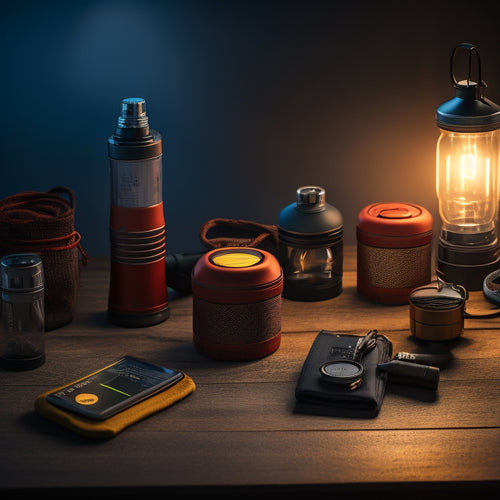
3 Best Home Battery Systems on Budget
Share
You can find cost-effective home battery systems that prioritize energy efficiency without sacrificing performance, offering a reliable solution for energy independence on a budget. SimpliPhi Power's PHI 3.4 kWh and 3.8 kWh systems, as well as PylonTech's US3000, stand out for their high depth of discharge and scalable designs. When selecting a system, consider key factors like energy storage capacity, compatibility, and backup power capability. By focusing on cost-effective solutions with high DOD ratings and built-in inverters, you can maximize your energy savings and optimize performance - and exploring further will reveal even more customized options for your specific needs.
Key Takeaways
- Affordable options like SimpliPhi Power PHI 3.4 kWh offer high depth of discharge for energy independence on a budget.
- Focus on cost-effective solutions with high DOD ratings to prioritize energy efficiency and maximize usable energy per cycle.
- Built-in inverters and advanced battery management systems in systems like PylonTech US3000 simplify installation and enhance performance while reducing costs.
- Scalable designs allow for the addition of more batteries as needed, making it easy to upgrade your system over time.
- Top budget-friendly picks include SimpliPhi Power PHI 3.8 kWh and Fortress eVault 18.5 kWh, which provide high energy density and long lifespans.
Top Picks for Budget Friendly Systems
With budget constraints in mind, you're likely searching for home battery systems that deliver reliable performance without breaking the bank.
Fortunately, there are affordable options available that can provide energy independence without sacrificing quality.
When evaluating cost factors, it's important to take into account the component quality and battery capacity, as these greatly influence the overall cost of the system.
For instance, the SimpliPhi Power's PHI 3.4 kWh battery system is a cost-effective solution that offers a high depth of discharge, ensuring you get the most out of your investment.
Another option is the PylonTech US3000, which boasts a high energy density and a long lifespan, making it an excellent value for its price.
When exploring budget-friendly systems, look for manufacturers that offer scalable designs, allowing you to add more batteries as needed, and those with built-in monitoring systems to optimize performance.
Key Features to Consider for Homes
When selecting a home battery system, you need to contemplate the specific features that will cater to your unique energy needs. Consider the type of energy storage you require, whether it's for backup power during outages or to optimize your energy consumption. Additionally, think about the installation costs, as they can vary greatly depending on the complexity of the system and the location of your home.
| Feature | Description | Importance |
|---|---|---|
| Energy Storage Capacity | Measures the amount of energy the system can store | High |
| Depth of Discharge (DOD) | Determines how much of the stored energy can be used | Medium |
| Compatibility with Existing Systems | Guarantees seamless integration with your current energy setup | High |
Best Value for Money Options
Your energy budget is about to get an enhancement. When it comes to finding the best value for money options, you'll want to focus on cost-effective solutions that prioritize energy efficiency.
Look for systems with high depth of discharge (DOD) ratings, as they'll provide more usable energy per cycle. Additionally, consider systems with built-in inverters, which can simplify installation and reduce overall costs.
Advanced battery management systems optimize charging and discharging for better performance and remote monitoring features enable real-time energy management and alerts.
Some top picks in this category include the SimpliPhi Power PHI 3.8 kWh and the Fortress eVault 18.5 kWh. These systems offer a great balance of performance, features, and affordability.
Frequently Asked Questions
Can I Install a Home Battery System Myself to Save Money?
You can attempt a DIY installation to save on labor costs, but be aware that safety concerns and maintenance requirements may outweigh potential cost savings, and guarantee system compatibility to avoid future issues.
How Long Does It Take to Charge a Home Battery System?
"Imagine having a fully charged home battery system, ready to power your home - but how long does it take to get there? You'll find that charging speed varies, typically taking 2-5 hours, depending on the system's capacity and charging method, which can impact battery lifespan.
Are Home Battery Systems Compatible With All Solar Panels?
You'll find that most home battery systems are compatible with various solar panels, but it depends on the system type; for instance, lithium-ion batteries work seamlessly with most panels, while lead-acid batteries might require specific panel configurations for ideal solar panel compatibility.
Do Home Battery Systems Provide Backup Power During Grid Outages?
You'll achieve enhanced power reliability and energy independence with home battery systems, which provide backup power during grid outages, allowing you to keep essential appliances running and maintain a steady supply of electricity when the grid goes down.
Are There Any Government Incentives for Home Battery System Purchases?
You're eligible for government incentives when purchasing a home battery system, including rebates and tax credits, which can greatly reduce your upfront costs, making the investment more affordable and increasing your overall return on investment.
Related Posts
-

Best Solar Powered Flashlights for Emergency Situations
When you're choosing the best solar-powered flashlights for emergency situations, focus on their brightness, battery ...
-

Top-Rated Home Solar Power Kits for Achieving Energy Independence
Top-rated home solar power kits enable you to achieve energy independence by greatly cutting your energy costs. You c...
-

High-Efficiency Solar Battery Chargers for Remote Areas
High-efficiency solar battery chargers are essential for your off-grid energy needs in remote areas. They maximize en...


